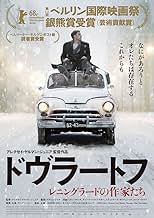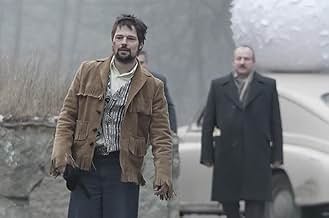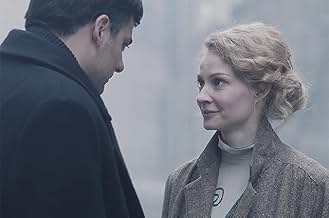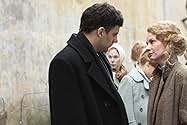VALUTAZIONE IMDb
6,4/10
2301
LA TUA VALUTAZIONE
È il 1971 e in questa puntata vengono narrati i quattro giorni di vita del celebre scrittore Sergei Dovlatov, dove si pone l'eterna questione della cultura russa ed europea: la questione del... Leggi tuttoÈ il 1971 e in questa puntata vengono narrati i quattro giorni di vita del celebre scrittore Sergei Dovlatov, dove si pone l'eterna questione della cultura russa ed europea: la questione della scelta morale.È il 1971 e in questa puntata vengono narrati i quattro giorni di vita del celebre scrittore Sergei Dovlatov, dove si pone l'eterna questione della cultura russa ed europea: la questione della scelta morale.
- Regia
- Sceneggiatura
- Star
- Premi
- 5 vittorie e 11 candidature totali
Danila Kozlovsky
- David
- (as Danila Kozlovskiy)
Tamar Hovhannisyan
- Nora Dovlatova - Sergei Dovlatov mother
- (as Tamara Oganesyan)
Anna Yekaterininskaya
- Deputy director of the plant
- (as Anna Ekaterininskaya)
Sergei Tolstov
- Factory Newspaper Editor
- (as Sergey Tolstov)
Maria Järvenhelmi
- Finnish tourist
- (as Mari Yarvinkhelmi)
Nikolai Shatokhin
- Dovlatov's friend
- (as Nikolay Shatokhin)
Recensioni in evidenza
It's not an easy movie for the viewer. However, it is an addictive cinema. The film is a biography of a writer who did not live to see his work published during his lifetime, so it focuses on impotence, unfulfillment and bitterness. A few days from Dovlatov's life, which we observe on the screen, is therefore a pretext for showing his everyday work - the attempts to publish a text instead of a little ambitious journalistic texts, showing his family and friends, the bohemian environment of Leningrad / St. Petersburg.
The film has a very calm rhythm, it is beautifully photographed and well played. The central figure is the ubiquitous Milan Maric (strikingly similar to Sergei Dovlatov), but although he is present on the screen in almost every scene, he does not dominate history and other characters.
Definitely worth seeing is a film for all those who are interested in showing the creative process on screen or in the reality of life in Soviet Russia.
The film has a very calm rhythm, it is beautifully photographed and well played. The central figure is the ubiquitous Milan Maric (strikingly similar to Sergei Dovlatov), but although he is present on the screen in almost every scene, he does not dominate history and other characters.
Definitely worth seeing is a film for all those who are interested in showing the creative process on screen or in the reality of life in Soviet Russia.
Saw this at the Berlinale 2018, where it was part of the Competition for the Golden/Silver Bear. A lot of faces pass by, in crowded apartments or various other just as crowded places. Some of those faces will reappear several times. No need to remember all of them, apart from the main protagonist, his ex-wife and daughter of course, as there is no continuing story that brings you from A via B and C to Z.
The division in six days is also not really relevant. It gives you a clear marker, however, that the movie jumps to something completely different each time a date appears on screen. It provides for some structure albeit not crucially important.
There is room for humor, not too much as there is no happy ending (no spoiler: we know this writer was not recognized in his own country and emigrated later, and we also know his own country valued him not until after his death).
Be prepared for name dropping of several famous writers, most of whom I recognize vaguely by name, but have never read them in my life. Maybe you have better luck in fitting them in the context in which their name is mentioned, and judge the name dropping as appropriate or merely done out of pomposity (I assume the former, given the circles our main protagonist usually is in, where one surely knows these names and would protest immediately when improperly quoted).
Trick question: did this movie enlighten me about the period and Russian politics at the time?? No, I think not. But anyone who has read some of the writers who have been quoted, may think otherwise. Several reviewers mentioned that it was a time of a stand still.
What this movie makes abundantly clear, is that the regime does not allow frivolities with their policy, keeping a tight lease on all publications such as journals, magazines and books. It is something that all such regimes seem inclined to do as a matter of course. Is that only to close the ranks, out of fear that the communist dream is not so rosy as one is taught?? Or it is just to not endanger the positions of the current politicians?? I assume that all of the above applies. It seems to apply equally to contemporary dictatorial regimes (Turkey, Iran, and many others), a parallel observation that makes this movie more relevant than it intrinsiccally is when considering the Brezjnew period alone.
The division in six days is also not really relevant. It gives you a clear marker, however, that the movie jumps to something completely different each time a date appears on screen. It provides for some structure albeit not crucially important.
There is room for humor, not too much as there is no happy ending (no spoiler: we know this writer was not recognized in his own country and emigrated later, and we also know his own country valued him not until after his death).
Be prepared for name dropping of several famous writers, most of whom I recognize vaguely by name, but have never read them in my life. Maybe you have better luck in fitting them in the context in which their name is mentioned, and judge the name dropping as appropriate or merely done out of pomposity (I assume the former, given the circles our main protagonist usually is in, where one surely knows these names and would protest immediately when improperly quoted).
Trick question: did this movie enlighten me about the period and Russian politics at the time?? No, I think not. But anyone who has read some of the writers who have been quoted, may think otherwise. Several reviewers mentioned that it was a time of a stand still.
What this movie makes abundantly clear, is that the regime does not allow frivolities with their policy, keeping a tight lease on all publications such as journals, magazines and books. It is something that all such regimes seem inclined to do as a matter of course. Is that only to close the ranks, out of fear that the communist dream is not so rosy as one is taught?? Or it is just to not endanger the positions of the current politicians?? I assume that all of the above applies. It seems to apply equally to contemporary dictatorial regimes (Turkey, Iran, and many others), a parallel observation that makes this movie more relevant than it intrinsiccally is when considering the Brezjnew period alone.
Why? I was waiting for this movie and familiar with Dovlatov's story, but the movie was disappointing from the very beginning. First, something is completely wrong with the way Main actor talks. He murmurs, doesn't pronounce half of the letters and sound completely non-professional. Second, the work of director very primitive. Also, acting stars were only supporting characters and you couldn't really enjoy enyone's performence. Overall, feels like everyone is slacking while working on that movie set.
Maybe not the best. for Comunism. for Dovlatov. for the atmosphere of Soviet Union. the cause - the less courage/art/science of director to move the things out of superficial perspective. sure, for a Eastern public, it works. for the memories about period, for the lectures about it, maybe for the familiarity of Dovlatov and Brodsky writings. but it is not real enough . the good point - the work of Danila Kozlovsky. but this is not a surprise.
10gokselll
What a good movie!!!
In this movie audience witnesses a week of Russian author Dovlatov's life. Panoramic view of those seven days shows interesting details of everyday lives of intellectuals and artists in the late period of USSR.
Within a plain but masterfully designed visual composition, with no agitative langue, the movie presents satirical sub-texts on pressure of state-bureaucratic principles on artistic production, degeneration of USSR administrative regime and confliction of factual-economical position of artist in life and existential and inherent artistic motivation etc...
Critics on state-art relation in this movie not only satire historical conditions in USSR but also compose a general and actual critical sense on relevant matters indicating negative picture of the ideal conditions.
Watching "Dovlatov" is a great cinematic pleasure, a great experience!
In this movie audience witnesses a week of Russian author Dovlatov's life. Panoramic view of those seven days shows interesting details of everyday lives of intellectuals and artists in the late period of USSR.
Within a plain but masterfully designed visual composition, with no agitative langue, the movie presents satirical sub-texts on pressure of state-bureaucratic principles on artistic production, degeneration of USSR administrative regime and confliction of factual-economical position of artist in life and existential and inherent artistic motivation etc...
Critics on state-art relation in this movie not only satire historical conditions in USSR but also compose a general and actual critical sense on relevant matters indicating negative picture of the ideal conditions.
Watching "Dovlatov" is a great cinematic pleasure, a great experience!
Lo sapevi?
- ConnessioniFeatures Romantyczni (1970)
I più visti
Accedi per valutare e creare un elenco di titoli salvati per ottenere consigli personalizzati
- How long is Dovlatov?Powered by Alexa
Dettagli
- Data di uscita
- Paesi di origine
- Siti ufficiali
- Lingue
- Celebre anche come
- Dovlatov
- Luoghi delle riprese
- Aziende produttrici
- Vedi altri crediti dell’azienda su IMDbPro
Botteghino
- Lordo in tutto il mondo
- 2.187.653 USD
- Tempo di esecuzione
- 2h 6min(126 min)
Contribuisci a questa pagina
Suggerisci una modifica o aggiungi i contenuti mancanti

![Guarda Trailer [OVS]](https://m.media-amazon.com/images/M/MV5BZjQ0ODcwYTMtZmU2OC00ZDFlLTkyZTgtY2Y0NDFjMjJmNmZlXkEyXkFqcGdeQXRyYW5zY29kZS13b3JrZmxvdw@@._V1_QL75_UX500_CR0)
































